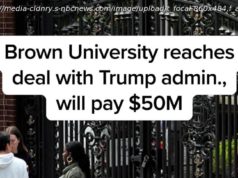The two companies are betting that regulators will finally allow the American wireless market shrink to just three national players.
Sprint and T-Mobile announced on Sunday that they had reached a deal to merge, moving to create a new telecommunications giant — and betting that regulators would finally allow the American wireless service market to shrink to just three national players.
The new company, which would keep the T-Mobile name, would have nearly 100 million retail subscribers. That would give the combined businesses serious heft in a fight against Verizon and AT&T, the two industry leaders that currently control a majority of the American wireless market.
Sprint and T-Mobile have tried repeatedly to merge, arguing that combining is the only way they can compete. Their previous two attempts, though, have failed: in 2014 because of opposition from regulators in the Barack Obama administration, and last year because of disagreements over control of the unified company.
The question this time is whether Washington regulators, even under a Trump administration that has sometimes looked more favorably on mergers, will allow one of the most transformative consolidation effort in years to take place.
Critics worry that shrinking the American wireless industry to just three providers would lead to higher prices for consumers, though the companies, in their announcement of the deal, argued that a merged company would “provide U. S. consumers and businesses with lower prices, better quality, unmatched value, and greater competition.”
The parent companies of each carrier — SoftBank of Japan, which controls Sprint, and Deutsche Telekom of Germany, which owns a majority of T-Mobile — managed to solve the longstanding issue of control in recent weeks.
Under the terms of the all-stock deal announced on Sunday, Deutsche Telekom will own roughly 42 percent of the combined business and have nine of 14 seats on the new T-Mobile’s board. SoftBank will own 27 percent and have four seats, one of which would be held by its founder, Masayoshi Son. Public shareholders would own the remainder.
John Legere, T-Mobile’s chief executive and an architect of a low-cost strategy that ignited a price war among American wireless service providers, will run the merged company. The business will have headquarters in both Bellevue, Wash., where T-Mobile is based, and Overland Park, Kan., Sprint’s home.
“This combination will create a fierce competitor with the network scale to deliver more for consumers and businesses in the form of lower prices, more innovation, and a second-to-none network experience — and do it all so much faster than either company could on its own,” Mr. Legere said in a joint news release.
Sprint and T-Mobile argue that combining will help them afford the billions needed to expand their so-called 5G network, a fifth-generation wireless technology that promises to bring ultrafast broadband speeds to mobile service. It is the standard that will be used to connect home appliances, cars and smartphones online via fiber optic lines to the home.
Sprint and T-Mobile are harder pressed than the competition to build the network. Sprint has about $32 billion in debt on its books, while T-Mobile generates a fraction of the cash that Verizon and AT&T do.
“Going from 4G to 5G is like going from black and white to color TV,” Marcelo Claure, Sprint’s chief executive, said in the news release. “It’s a seismic shift — one that only the combined company can unlock nationwide to fuel the next wave of mobile innovation.”
At the same time, the four big wireless providers are increasingly competing against newer contenders looking to chip away at their market, including the cable providers Comcast and Charter Communications.
The announcement on Sunday takes a step toward fulfilling a long-frustrated dream of Mr. Son of SoftBank. When his company took control of Sprint in 2013, he boasted of defeating Verizon and AT&T in their own backyard. But to do so, he needed a bigger platform than Sprint alone, and he quickly began talks to buy T-Mobile, which, at $55 billion, has more than twice the market value as Sprint.
The stakes are big for both sides, but especially for Mr. Son. Sprint has lost billions of dollars and millions of subscribers, while taking on debt, since SoftBank took it over. By contrast, T-Mobile, buoyed by a hugely popular unlimited data plan and an aggressive marketing campaign, leapt over its beleaguered rival to take third place in the American wireless rankings.
Yet it is T-Mobile’s success that could provide the basis for a regulatory challenge of the deal. At least under the Obama administration, the Federal Communications Commission and the Justice Department — which would both weigh in on this merger — have argued that shrinking the number of national wireless players could lead to less competition and higher prices.
Mr. Son, in particular, has bet that his courting of President Trump with promises of significant investment in the United States would help this transaction win regulators’ approval.






